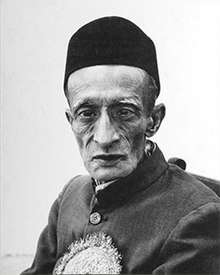Jyotindra Dave
Jyotindra Hariharshankar Dave was a Gujarati humourist writer from India. Born and educated at Surat, he is regarded as a great humourist writer in Gujarati literature.
Jyotindra Dave | |
|---|---|
 | |
| Born | Jyotindra Hariharshankar Dave 21 October 1901 Surat, Gujarat, India |
| Died | 11 September 1980 (aged 78) Bombay, India |
| Occupation | humourist, author |
| Language | Gujarati |
| Nationality | Indian |
| Notable works | Ame Badha (1935) |
| Notable awards |
|
| Spouse | Karsukhben Dave
( m. 1929; |
Life
He was born in Surat on 21 October 1901. He completed matriculation in 1919, BA in 1923 and MA in 1925 from Surat. He joined K. M. Munshi in Bombay to write history of Gujarati literature from 1926 to 1933. He taught at Kabibai highschool in Mumbai for brief period when Munshi was in jail. He also co-edited Gujarat monthly. From 1933 to 1937, he taught Gujarati language at MTB College, Surat. On Munshi's request, he returned to Bombay in 1937 and worked as a translator in Oriental office of Bombay Government until his retirement in 1956. He later taught Gujarati in various colleges of Bombay and later served as a principal in college at Mandvi, Kutch. He also served as a president of Gujarati Sahitya Parishad in 1966.[1][2] In later years, he co-edited the fortnightly Samarpana.[3]
He spent his later years in Bombay and died there on 11 September 1980.[1][2] His house is located in Amliran area of Surat.[4]
Works
Dave used all forms of humor in his writing including satire, parody, wit, conceit.[2] He is considered as one of the best humorists in Gujarati literature.
Dave's first humorous sketches were published in literary journals from 1927 to 1932 under the pseudonym of Gupta. It was well received by the readers and were published later as Mari Nondhapothi, followed by Rangatarang Vol. 1-6 (1932 - 1946), which contains humorous essays, short plays, verse prosodies and other miscellaneous writing. He is known for his humorous novel Ame Badha (1936), co-written with Dhansukhlal Mehta. It depicts the humorous account of the life of Surat, the native city of both authors. The plotline consists of events in the life of the protagonist Vipin from his birth to the marriage.[3]
Selected works
- Hasya-tarang (1945)
- Pan na Beeda (1946)
- Alpatma nu Atmapuran (1947)
- Ret ni Rotli (1952)
- Jya Tya Padey Najar Mari (1965)
Awards
He received Ranjitram Suvarna Chandrak in 1941. He also received Narmad Suvarna Chandrak in 1940.[1]
Personal life
Dave married Karsukhben in 1929, and they had a daughter Rama, and two son, Pradip and Asit.[5]
See also
References
- "Jyotindra Dave" (in Gujarati). Gujarati Sahitya Parishad. Retrieved 31 July 2014.
- George, K. M. (1992). Modern Indian Literature, an Anthology: Plays and prose. 3. Sahitya Akademi. p. 205. ISBN 9788172017835.
- Choudhuri, Indra Nath, ed. (2011). Encyclopaedia of Indian Literature: D-H. VOL. II (Revised ed.). New Delh: Sahitya Akademi. pp. 1287–1288. ISBN 978-81-260-3080-4.
- "Fire at writer Jyotindra Dave's house in Surat". Daily News & Analysis. 2012-11-13. Retrieved 2017-07-23.
- Joshi, Chiragkumar G. (2016). Translation of Selected Humorous Essays from "Rang Tarang" by Jyotindra Dave with Critical Introduction (Ph. D.). Rajkot: Department of English, Saurashtra University.